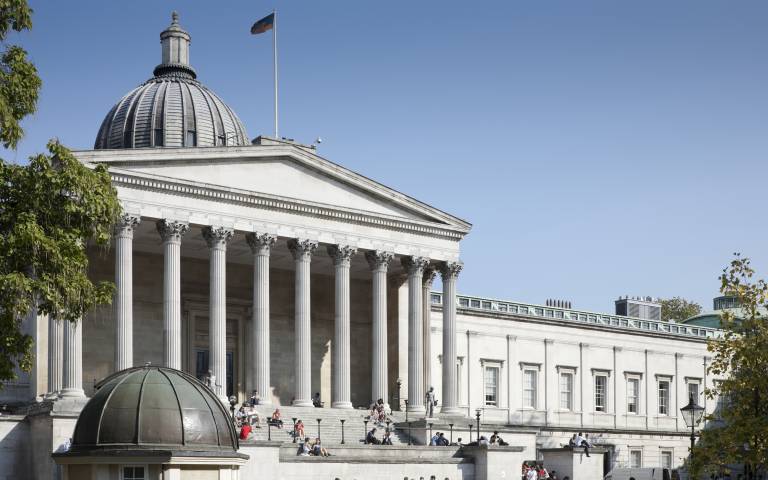UCL to host first-ever global conference on tackling sexual misconduct in higher education
26 May 2020
UCL is proud to be hosting a two day online conference to share global best practice on sexual misconduct prevention in higher education on Wednesday 17th and 18th June 2020.

The ‘Calling Time on Sexual Misconduct’ conference’, which is believed to be the first of its kind in the world, will look at how higher education institutions can move beyond policies and share best practice and experiences to create sustainable change.
Featuring a host of word-leading experts and speakers in the field of sexual misconduct prevention from countries including Australia and the US, the conference will examine areas such as best practice prevention programmes, understanding experiences of sexual violence, effective bystander intervention and lasting behavioural change.
Speakers come from organisations including Monash University, Universities Australia, 1752 Group, McAllister Ollivarius and Bucknell University. UCL’s own researchers Dr Paul Chadwick (UCL Centre for Behaviour Change), Dr Caroline Selai (UCL Institute of Neurology) and Conor Courtney (UCL Laws) will all present at the conference.
The conference is sponsored by Culture Shift, the tech-for-good organisation that has built the Report + Support platform, which empowers universities to proactively tackle bullying or harassment of any kind.
The #MeToo movement prompted a global discussion on abuse of power within the workplace. Two years on, higher education institutions in the UK and abroad are under increased pressure to improve support for those affected, and respond to sexual misconduct timely and effectively. The current pandemic poses new challenges for universities in tackling online harassment and domestic abuse.
One of the outcomes of the conference is to establish a global network of practitioners, students and staff who continue to share learning and provide a platform for collective effort in tackling sexual misconduct.
UCL President & Provost Professor Michael Arthur said: “While this issue is not unique to the higher education sector, I am in no doubt that all institutions can, and must do better, in preventing and addressing bullying and sexual misconduct. We must do this through increased transparency in reporting and taking meaningful and effective action to address unacceptable behaviour.
“I am proud that UCL is hosting this conference. While there is much to be done, I hope we will make real progress towards creating a welcoming and inclusive environment for students and staff through sharing global best practice and collaboration.”
Conference organiser Kelsey Paske, UCL’s Behaviour and Culture Change Manager, said: “The issue is not unique to universities, however universities have a unique role to play in prevention. UCL is proud to facilitate a global conversation to advance best-practice and foster collaboration.”
Gemma McCall, Co-Founder and CEO of Culture Shift added “With a proven track record of activating positive change in educational institutions, we’re so proud to align with UCL on this important issue. I’m passionate about the sector taking learnings and guidance from policies and using them to create real change, with a survivor-first mentality at the core. We hope this conference will be a catalyst for that, as well as removing any stigma around reporting harassment.”
UCL has taken a number of proactive measures around bullying, harassment and sexual misconduct which include:
- UCL has launched an online reporting tool for students and staff to report issues of unacceptable behaviour; ‘Report + Support’ - which focuses on cultural and behaviour change.
- The tool is being accompanied by UCL’s first institution-wide campaign called ‘Full Stop’. This focuses on how all members of the UCL community can play an active role in shaping a welcoming and inclusive environment for students and staff. The campaign provides helpful resources and include calls to action at an individual, departmental/faculty and institutional level. Part of this requires that we no longer excuse poor behaviour, or minimise the experiences of those affected.
- Approved and implemented the new Prevention of Bullying, Harassment and Sexual Misconduct Policy, and revised the Personal Relationships Policy which prohibits relationships between students and staff where there is direct supervision.
- Engaged staff and PhD students in Where do you draw the line? training on preventing harassment and bullying. Almost 3,000 staff have received training to date. Taking the Lead training has also been delivered to 400 managers across UCL.
- Set up a Preventing Sexual Misconduct Strategy Group to oversee the work undertaken to ensure UCL provides a welcoming and inclusive environment for all students and staff.
- Established an agreement with Intersol Global to improve the quality and consistency of investigations. As a result, investigation and report writing time has decreased significantly.
- Banned the use of non-disclosure agreements in settlement agreements with staff or students who have raised genuine complaints of sexual misconduct, bullying or harassment.
- Established an institutional agreement with Rape Crisis South London for the provision of specialist outreach support and counselling, and a robust training package.
UCL and Students’ Union UCL recently launched the I ❤ Consent’ campaign, which is a free interactive online training course on sexual consent.
Links
- Conference registration is open, with the full programme and registration details available on the website.
Image
- UCL portico. Credit: UCL
 Close
Close

